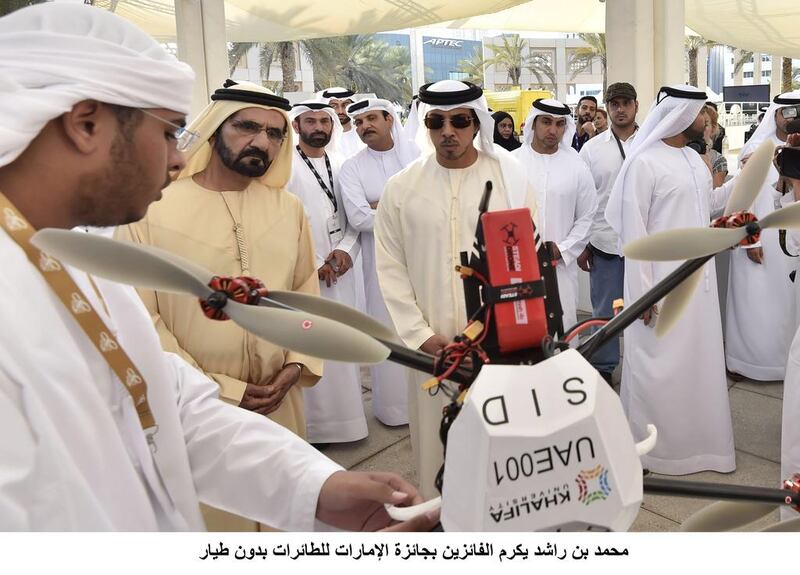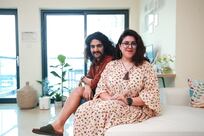DUBAI // Telecommunications company Etisalat took first prize at this weekend’s Drones for Good finals with its device to enhance the quality of network coverage.
Etisalat was one of five government entities to reach the finals of the competition, which featured national, international and government entries.
Also honoured were the Ministry of Interior and a UAE team’s project to monitor wildlife and collect photos.
Salem Al Marri, 20, was one of a host of Emirati students to stand up against industry’s heavy-hitters at the competition.
The third-year electronics student from Dubai Men’s College is head of Emirates Robotics Club, based at the college. He led a team on a project commissioned by the Ministry of Labour which was entered in the government category.
Its site inspection drone is designed to ensure safety measures such as the use of harnesses, safety boots and monitor living conditions at labour camps.
The 3 kg device can transmit real time video and remain in the air for up to 20 minutes.
“It’s been used already, and the ministry told the judges it would be on a daily basis,” said Mr Al Marri.
He said being part of the competition, win or lose, was a big achievement.
“Just making the final is like a win, meeting all these people. It’s a great opportunity for us to be here,” he said. “Students are capable of delivering high standard projects and we’ve proved that by being here. I hope there are more competitions like this.”
Sheikh Mohammed bin Rashid, Vice President and Ruler of Dubai, paid tribute to winners and sponsors.
“The scene of unmanned drones flying in the UAE sky, with each carrying an innovative idea for the service of man, cherishes the message that there is no limit for innovative ideas,” he said.
Fahad Al Shaibani is another of the Emirati students who did the country proud at the competition where each category winner landed a Dh1m prize.
The 20-year-old from Khalifa University was part of a team that created a site inspection drone for the national section
More than 800 entries were submitted but only five in each category were chosen for the finals.
Mr Shaibani and his team developed a drone to help enforce regulations at labour camps, from ensuring employees take their midday break to sites operating outside permitted hours and building work that exceeded permitted boundaries.
The device is also capable of post construction inspections, its creators said.
Mr Al Shaibani said: “We were looking at the municipalities [as possible clients] and it’s a hard job that’s very time consuming and covering a huge area.”
The drone, which would cost between Dh20,000 and Dh30,000, has a live internet feed capacity and can provide three-dimensional imagery of a building site.
Iman Hableel, 26, recently graduated from Khalifa University with her master’s in information security.
She was also on the inspection drone team and said that beating competition from industry was the highlight of the event.
“This is encouraging the students to be innovative, and even the companies and industries are being encouraged to adopt the students projects that they see here,” Ms Hableel said. “The competition allows students and experts to come together with industry. It’s a great opportunity.”
Mishal Al Marzooqi, who works for the Abu Dhabi National Oil Company, was a member of the Emirati team that built a drone for the Dubai Health Authority to take medicine to special-needs patients and deliver first aid kits and blood supplies in cases of emergency. “Those with special needs have challenges to get to the hospital every time,” he said. “You register online and the medicine is delivered to your home once you scan your ID.”
The flying device can deliver medicine to up to 10 families a day, and would be based at clinics rather than hospitals, so they are closer to residential areas.
The drone can travel at 70kmph for up to 30 kilometres.
The first aid kits are complete with live instructions from a specialist at the clinic or hospital who connects by smartphone.
“This allows anyone to be able to administer emergency first aid,” said Mr Al Marzooqi.
The idea is also to use the drone for routine administrative purposes such as delivering medical cards and test results.
The Dh30,000 drone, set up like a mobile pharmacy with temperature control to protect the lifegiving payload, can fly for up to 40 minutes and carry 10kg.
mswan@thenational.ae






